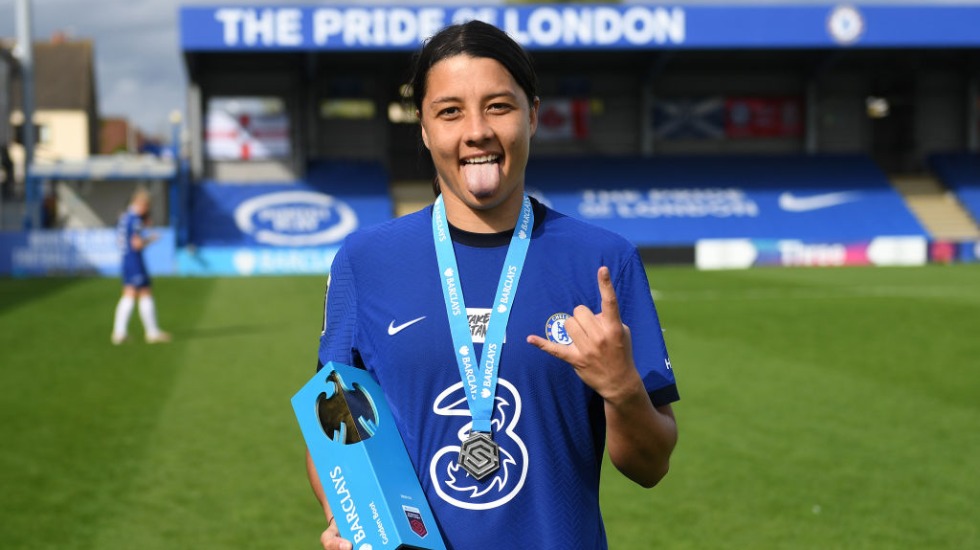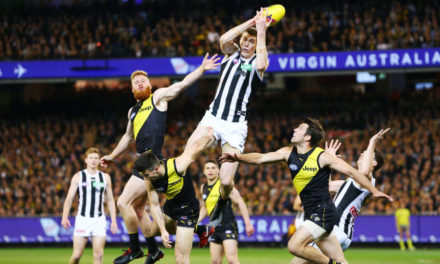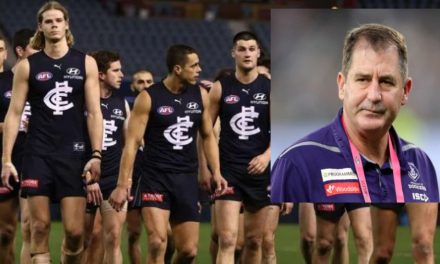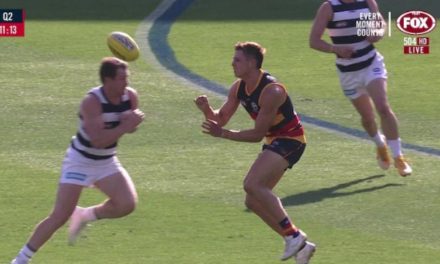Sam Kerr celebrates Chelsea’s title win and her Golden Boot award last weekend in London. Photo: GETTY IMAGES
It speaks volumes as to the struggle football endures in Australia that up until a few years ago, the most regular question aimed at one of its biggest stars – Sam Kerr – was whether (or even when) she was going to play AFLW.
Kerr was regularly introduced as “the brother of Daniel” in deference to the former West Coast player. Both were rather disrespectful, given the level Sam was playing at then.
But if they were disrespectful then, they are nonsensical now.
Kerr’s move to Chelsea in the FA Women’s Super League has elevated her into a different level. On the back of some serious investment, the culmination of which is a new TV deal worth between £7-8 million ($A12-14 million) starting next season, Europe has swiftly become the Mecca of women’s football in the same way it has long been for the men’s.
Kerr scored in the final regular game of the Super League season against Reading to confirm Chelsea’s fourth title. She also took out the competition’s Golden Boot after netting 21 goals in 22 matches.
But it’s the winners medals (Chelsea also won the FA Women’s League Cup) which will feel particularly sweet.
Perth’s favourite daughter has racked up a whole string of individual awards in recent years (the Ballon d’Or being a notable exception), but she has largely missed out on the major team honours. She was part of the Matildas squad that lifted the Women’s Asian Cup in 2010, but her only championship medal – prior to this season – came with Sydney FC in the W-League, back in 2013.
Now, after the domestic double in England, she has the chance to win the biggest of the lot, as Chelsea take on Barcelona in the final of the UEFA Women’s Champions League in Gothenburg on Sunday. Assuming she’s selected to play, Kerr will become the first Aussie even to appear in the final in its modern guise.
The only others to play in the big showdown are ex-Matildas Sharon Black and Alison Forman, for Fortuna Hjorring, in the two-legged final of the competition’s predecessor, the UEFA Women’s Cup, in 2003. The Danish outfit lost to Swedish team, Umea, 7-1 on aggregate.
Debate is starting to rage already about Kerr’s place in the pantheon of all-time Australian greats. Such arguments are always subjective, and difficult to measure across different eras – let alone different genders.
But perhaps what can be agreed upon, is that if Kerr were to win the Champions League on Sunday, she will have just delivered the greatest single season by an Australian individual in history. Not convinced? Here’s her competition … in no particular order.
CRAIG JOHNSTON (Liverpool 1983/84) – Newcastle’s finest lifted the European Cup, the old First Division title and the Football League Cup in England that particular season, as well as featuring in the Club World Cup Final in December of that year – Liverpool losing 1-0 to Independiente. Johnston’s longevity at Liverpool was epitomised by the fact he won five league championships, one FA Cup, two League Cups, and that solitary European Cup. Johnston’s season 37 years ago is currently – statistically – the best-ever by an Australian in terms of the winning of, and individual contribution to, major titles.
ZELJKO KALAC (AC Milan 2006/07) – Do the achievements of “Spider” usurp even that of Johnston? Debatable. In 06/07, Kalac was part of the AC Milan squad that lifted the UEFA Champions League, and then later in the year, the UEFA Super Cup and the FIFA Club World Cup to boot. Three big titles. Yet Kalac was used only sparingly throughout the season, appearing just three times in the Champions League campaign as back-up to Brazilian first choice, Dida – and not at all in the other two competitions. He played more games in Serie A (10), but Milan finished that campaign in fourth place domestically.
PLEASE HELP US CONTINUE TO THRIVE BY BECOMING AN OFFICIAL FOOTYOLOGY PATRON. JUST CLICK THIS LINK.
ELLIE CARPENTER (Melbourne City/Lyon 2019/20) – It went largely unrecognised outside the game in Australia, but the girl from Cowra had an incredible season last year. Culminating in a UEFA Women’s Champions League winners medal with Lyon (where she was an unused substitute in the final against Wolfsburg), Carpenter also won the W-League double (Premiership and Championship) with Melbourne City, and took out the W-League Young Player of the Year award for the third year running.
MARK BOSNICH (Manchester United 1999/2000) – The turn of the millennium saw “Bozza” at the peak of his powers. A move to Manchester United to replace the legendary Peter Schmeichel was an instant success, with Bosnich playing 23 games as United retained its English Premier League title. Midway through that particular campaign, Bosnich also went to Tokyo with the Red Devils and won the FIFA Club World Cup, where he put in a brilliant display in the final against Palmeiras. He was also voted Oceania Goalkeeper of the Century in 1999.
HARRY KEWELL (Liverpool 2004/05) – Kewell had arrived at Liverpool the season before, but he’d had a disrupted season ahead of the UEFA Champions League Final against AC Milan. He lasted only 23 minutes of that epic contest, in which Liverpool famously came back from 3-0 down to claim the trophy on penalties. He also played in a losing League Cup Final against Chelsea that season, and the final of the FIFA Club World Cup in late 2005 – which also ended in defeat, to Sao Paulo.
SASA OGNENOVSKI (Seongnam 2010) – Virtually unknown in Australia when signing for Korean outfit Seongnam in 2009, big Sasa’s calendar year in 2010 was little short of extraordinary. He won the Asian Champions League as captain (scoring in the final against Zob Ahan), and was voted the competition’s most valuable player. He was later named AFC Asian Footballer of the Year for his efforts, was part of the K-League Best XI, scored at the FIFA Club World Cup, and made his debut for Australia. A month later (January 2011) he would reach the Asian Cup Final with the Socceroos.
MARK MILLIGAN (Melbourne Victory 2014/15) – “Millsy” had a remarkable 2014/15, winning the A-League title with Victory (he was voted the Joe Marston medallist in the final), the Premiership, and was part of Ange Postecoglou’s victorious Asian Cup winning squad in January 2015.
Yet Kerr can top the lot if she wins on Sunday, and perhaps becomes the first Australian to score in a (European) Champions League Final. Her 2020/21 season could get even better yet if the Matildas were to win a medal in Tokyo at the Olympics in July.
At 27, Kerr is at the peak of her career – and in two years’ time, injuries permitting, she’ll still be at the top of her game when the FIFA Women’s World Cup comes to Australia and New Zealand.
A World Cup winner’s medal as captain on home turf? Then the debate about the “greatest of all-time” may take on a whole different tone.












